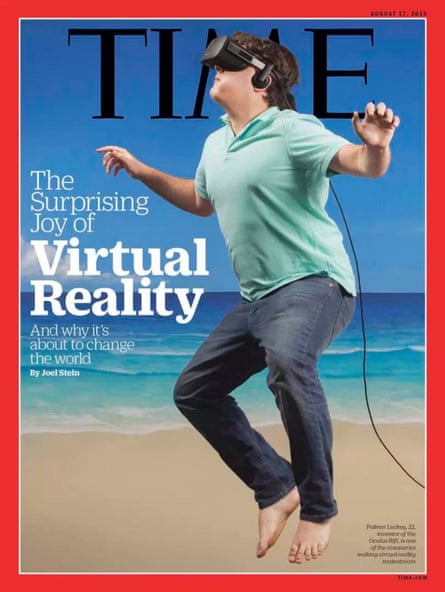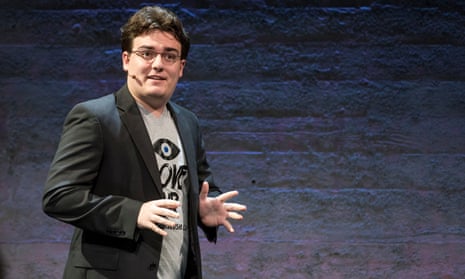It’s hard to love a 20-something multi-millionaire, but Palmer Luckey’s introduction to the mainstream consciousness helped cement his image as the good kind of tech industry titan: the adorkable garage tinkerer we can root for.
There he was on the cover of Time magazine, barefoot and leaping, his arms floppily akimbo, his face obscured by a virtual reality headset, and a wire extending down his back like the rattail hairstyle he might have worn if he had been born a decade earlier than he was, in 1992.
That wholesome image was complicated yesterday when the Daily Beast revealed that the Oculus founder has been secretly funding a group of Reddit trolls dedicated to electing Donald Trump by “shitposting” negative memes about Hillary Clinton.
“We know Hillary Clinton is corrupt, a warmonger, a freedom-stripper. Not the good kind you see dancing in bikinis on Independence Day, the bad kind that strips freedom from citizens and grants it to donors,” Luckey wrote on a Reddit thread introducing his initiative, using the pseudonym NimbleRichMan.
Luckey’s support for Trump may be unusual in a tech industry that has a tendency to support Democrats, but it is his embrace of the dark side of Trump’s internet army that is so alarming. We may be used to the incredibly wealthy supporting pro-business politicians by writing checks to the Republican party, but the full-on embrace of “shitposting” and the bigoted online harassment that so often comes with it is something else entirely.
Shitposting is not intended to add to an online discussion but to shut it down with, well, shit. It is the opposite of the ideals of good faith, open discussion made possible by the internet.
Since the Daily Beast report, Luckey has received scrutiny by reporters seeking evidence of an affinity between the man who invented Oculus Rift and the candidate whose campaign has centered on attacks on immigrants and Muslims. Among the revelations is the fact that Luckey’s long-time girlfriend, Nicole Edelmann, is an apparent supporter of GamerGate, the anti-feminist online harassment movement that erupted in 2014.
Luckey, it seems, represents both sides of the increasingly schizophrenic tech industry: innovating tools for increased connection and knowledge with one hand, and empowering reactionary abuse and harassment with the other.
Luckey was just 18 when he built the first prototype for a virtual reality headset that would go on to raise almost $2.5m on Kickstarter and $75m from venture capital firms. He sold his company to Facebook for $2bn in 2014, when he was just 21 years old.
“If I grew up in ‘da hood’ it would make my story so much more interesting – if I had something to escape from,” he told the Telegraph in 2015. Instead, he grew up middle class in southern California, where he was homeschooled by his mother. A video game enthusiast who made money repairing iPhones, he dropped out of college and began tinkering with virtual reality headsets while working in a trailer parked in the driveway of his parents’ house.

Luckey’s public image – like his Time magazine cover – seems appealingly unpretentious. He wears sandals or goes barefoot at work, a detail repeated in most articles about him. He drives a 2001 Honda. He is really, really into video games.
He is not cool and doesn’t want to be.
As virtual reality and Oculus have risen in stature in the technology world, Luckey has made gestures toward the higher purpose we like our tech moguls to embrace – the narrative about changing the world for the better. Facebook has been “mak[ing] the world more open and connected”. Google has been “organiz[ing] the world’s information and mak[ing] it universally accessible and useful”.
Luckey has spoken about the potential value of virtual reality for education, and VR boosters tend to hype its potential to increase human empathy by expanding our ability to experience other people’s lives.
Still, at heart, Luckey doesn’t appear as invested in the transformative possibilities of his technology as we might hope. Asked by the Telegraph what aspect of VR he was most excited about, he responded: “Video games. I’m a shallow person.”
Video games don’t have to be shallow, and gamers don’t all agree with GamerGate, but Luckey’s involvement in the Trump meme machine suggests that his investment in the social good of technology is indeed shallow.
“I thought it sounded like a real jolly good time,” he told the Daily Beast about the shitposting organization.
“The worst part is that I bought into VR and Oculus bc it has the potential to change how people view the world. It’s an empathy headset,” wrote one disappointed VR enthusiast on Reddit.
“VR has the potential to make internet communication more heartfelt and real. But Palmer has decided to use his capital to support a fucking meme factory that delves online discussion into racist, angry, anti-intellectual bullshit.”

Comments (…)
Sign in or create your Guardian account to join the discussion